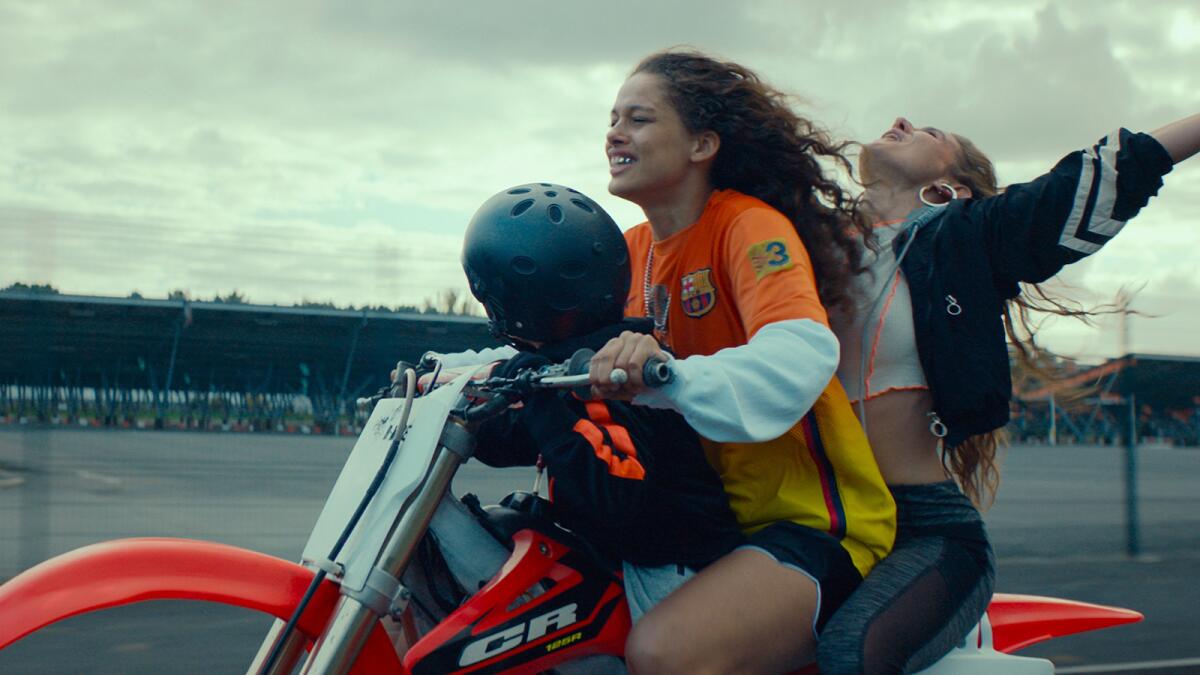A marginalized woman’s societal disconnect meets shock-edited naturalism in ‘Rodeo’

- Share via
French director Lola Quivoron’s debut feature “Rodeo” is set in the world of thrill-seeking motorbikers. Tight-knit posses of often disenfranchised youth, they share a kinship for gearhead prowess, but their dangerous displays of speed and stuntwork on France’s urban thoroughfares are now illegal.
First films can of course also be a form of showing off, and that is indeed part of what’s bracing and magnetic in Quivoron’s volatile joyride of crime and community. (Think Julia Ducournau of “Titane” notoriety having written a “Fast & Furious” movie for the Dardenne brothers.) “Rodeo” is not a flashy exercise, however, but rather a growling, heat-seeking piece of brutish theater as experienced by a tough young woman played by first-time actor Julie Ledru, whose own life in that world informed the story Quivoron has co-crafted with Antonia Buresi.
For your safety
The Times is committed to reviewing theatrical film releases during the COVID-19 pandemic. Because moviegoing carries risks during this time, we remind readers to follow health and safety guidelines as outlined by the CDC and local health officials.
We meet Julia (Ledru) in the throes of a loud, physical escape from men trying to constrain her — the reasons aren’t clear, but it’s obvious that being around people, and being held back, aren’t her favorite situations. Commanding a bike is what Julia lives for — she runs hot, but rides happy — and to make that happen, she’s got a neatly larcenous scam: convincing male motorbike owners into letting a smiling, flirtatiously knowledgeable female buyer test-drive their wheels, for which all they get in return is a middle finger as she tears off, that fake smile morphing into the loose grin of a free spirit.
In the all-male subculture of riders, however, her womanhood isn’t a plus, though her desexualized look and behavior — wild-haired, baggy and thuggish — blares discomfort with giving off, or accepting, anyone’s gender identity. Inserting herself into a local gang’s competition — or “rodeo,” as they’re called in France — she nonetheless encounters plenty of misogynist aggression, save the kind, mentoring attention from a respected member named Abra (Dave Nsaman). When the day turns violent and ends in bloodshed and tragedy, she’s accepted, albeit reluctantly, into the group, called the B-Mores. Excited to join but ever protective, Julia gives her name as “Unknown.”
The B-More crew operate out of a garage where they fix up bikes with stolen parts and resell them for a leader called Domino, currently serving time but clearly in control of things. As Julia nudges toward a bond with sweet-faced, attentive comrade Kaïs (Yanis Lafki), she makes herself indispensable with errands and her bike thievery smarts; she also finds herself wrestling with trust, bouts of hauntedness, and in her budding connection with Domino’s isolated wife, Ophélie (co-writer Buresi), and their young son, the possibility of an expanded life.
These cracked-open doors for Julia’s sense of belonging and freedom don’t feel particularly safe or assured, however, a mood reflected in the raw, serrated energy of Ledru’s performance, or the crunchy, shock-edited naturalism of Quivoron’s direction. Adding mightily to the swings between abandon and claustrophobic intensity is Raphaël Vandenbussche’s cinematography, like colored gravel, and Kelman Duran’s adrenalized soundscape of a score.
Needless to say, threats real and even ghostlike abound for Julia, and when her pitch for an ambitious, outrageous heist is OK’d and put in motion, we sense a moment of reckoning for her ability to be whoever and whatever she sees herself as: daredevil, master thief, earner, provider, escape artist, one of the guys, nobody’s girl, maybe none of it or all of it. If “Rodeo” doesn’t always seem to be clear itself as to who Julia is — outside of one tense exchange with a brother in the home she’s clearly no longer welcome in, back story is minimal — Quivoron’s acceptance of her roiling protagonist’s fluidity of self is its own propulsive asset, not unlike what made Barbara Loden’s indie masterpiece “Wanda” such a revelatory portrait of a marginalized woman’s societal disconnect. “Rodeo” takes its blind corners and open roads with plenty of ferocity, but also a necessary compassion for the searching force of nature at its center.
'Rodeo'
In French with English subtitles
Not rated
Running time: 1 hour, 47 minutes
Playing: Laemmle Royal, West Los Angeles
More to Read
Only good movies
Get the Indie Focus newsletter, Mark Olsen's weekly guide to the world of cinema.
You may occasionally receive promotional content from the Los Angeles Times.









